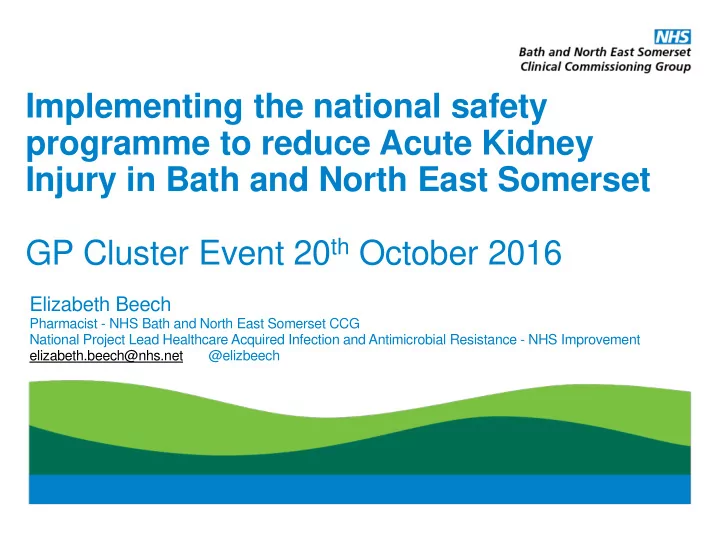

Implementing the national safety programme to reduce Acute Kidney Injury in Bath and North East Somerset GP Cluster Event 20 th October 2016 Elizabeth Beech Pharmacist - NHS Bath and North East Somerset CCG National Project Lead Healthcare Acquired Infection and Antimicrobial Resistance - NHS Improvement elizabeth.beech@nhs.net @elizbeech
Acute kidney injury facts – why it matters o Up to100,000 deaths a year are associated with acute kidney injury o Up to 33% of those deaths could be avoided o 1 in 5 people admitted to hospital as an emergency has acute kidney injury o The NHS is the first health system in the world to tackle acute kidney injury o 60% of acute kidney injury starts in the community o £500 million the additional cost to the NHS of acute kidney injury is estimated at each year
Bath and North East Somerset CCG aim to reduce the incidence of AKI occurring in primary care by 1. Education of healthcare staff to raise awareness of AKI and Think Kidneys 2. Encouraging the use of the Think Kidneys resources across the whole health economy to improve the care of people at risk of AKI 3. Supporting GP practices develop local practice care plan processes for people who are discharged from hospital following an AKI event 4. Raising awareness of AKI throughout the residents of B&NES using Think Kidneys resources and the appropriate use of self-care strategies such as ‘ sick day guidance ’ • AKI bulletin has been mailed to all GP practices and practice pharmacists • AKI at the next cluster meeting 20 th October 2016 to action plan in practice strategies, with topic experts invited
There are 3 AKI priority topics to discuss and plan practice actions • Topic 1: Care planning for patients who have been discharged after an AKI event • Topic 2: Managing AKI care and how to respond to AKI Warning Stage test results • Topic 3: Identifying people at risk of AKI and minimising risk Ambitious timing today so be realistic about the detail – aim for a plan that can be worked up back at practice level. This is not a quick fix issue. How can the CCG help your practice to deliver these activities? Tell us on your planning feedback
To help you start do this we have topic experts in the room • Dr Albert Power – Consultant Nephrologist, NBT • Dr Andrew Taylor – Consultant Biochemist, RUH • Dr Richard Brown – Avon LPC to represent community pharmacists and Practice Pharmacists – they can help with risk identification and sick day guidance Care Home Pharmacists – will be delivering an AKI educational bundle to all homes, joined up with the existing UTI education in Jan 2017. They will link this to the GP practice NH lead How can the CCG help your practice to deliver these activities? Tell us on your planning feedback
The Cake Is Too Small 20 th October 2016 Cluster meeting
CCG Budget What you overspend in one year you have to recoup the next. So if you delay making hard choices, you make the choices harder
For us as we stand • Total budget £230m • Target Surplus £2.3m • Forecast is deficit of £3.5m if we do nothing = £5.8m off Target • Solutions expected to deliver £1.2 – 2.2m • Gap of £3.6 – 4.8m to cover in 5 months
Why are we in difficulty Funded Nursing Care Increased by 40% Rise in Emergency Admissions Rise in Outpatient Referrals
So what?
What would it mean for you? • Difficult conversations with patients – Why can’t I have this anymore? • Money and performance are key – Quality? • Less control for CCG leadership • Which means – Focus on cost reduction NOT on investment – Reduction in services – Less ability to shift resources – Short term not long term
So what has CCG done? • Relocated Walk in Centre • MSK referrals via OIS • ISTC contract cost per case • High cost drugs cost control at RUH • Negotiated AWP to take risk on out of area placements • Audits on compliance Criteria Based access • Reviewed running costs
But … We have invested 160k Winter Pressures
Harrogate CCG
Policy changes Agreed by Joint Commissioning Committee (JCC) Subject to consultation 1. Cease prescribing of medicines for common ailments available OTC emphasis on Analgesics and Antihistamines (£120k +) 2. Cease prescribing of gluten-free products (£118k) 3. Reduce unnecessary prescribing by commissioning additional support to prescription clerks across practices (2017/18)
NEXT STEPS • Engagement exercise for stopping the GF and OTC medicines • Draft Timetable: By DATE: ACTIVITY 20.10.16 Staff Briefing & GP Cluster 27.10.16 Your Health Your Voice 1.11.16 Briefing to key stakeholders 10.11.16 Inform Board 21.11.16 Launch Consultation 20.12.16 Close Consultation Dec 17 Present findings to JCC Jan 17 Implement JCC Decision
The Engagement Exercise press release social media content two online/hard copy surveys CCG web content GP newsletter Letter to MPs/Councillors/Wellbeing Board/Select Committee/Parish Councils/VSCE groups/ providers/ neighbouring CCGs /pharmacists /NHSE/PPGs
MSK • Patellar resurfacing – Agreed JCC September – Systematic reviews indicate no significant benefit to routine resurfacing of the patella – Costs extra £3.5k per case • Direct access MRI – In discussion with RUH – Expensive investigation not always appropriate • Shoulder for example – Primary care spinal MRIs Intervention rate – Capacity issues at RUH
MSK • Facet joint injections – Agreed JCC September – NICE guidance for non-specific low back pain, did not show evidence of benefit from facet joint injection • Criteria Based Access to IFR – Agreed JCC September – More procedures have been moved to ensure appropriate use
The questions are • What do you like about the proposals? • What concerns you about the proposals? • Where should we have exceptions? • How can the CCG work with the practice to help the engagement process • What other ideas do you have?
Recommend
More recommend